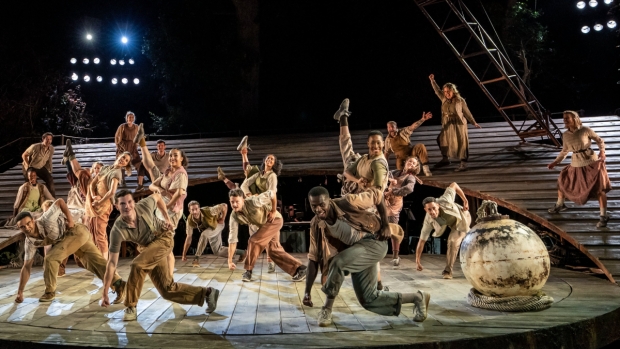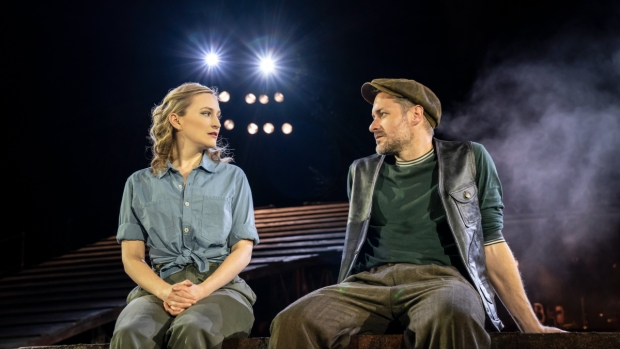Carousel at Regent's Park Open Air Theatre – review
Rodgers and Hammerstein’s musical returns in a new outdoor revival

© Johan Persson
Before a note has been sung or a word spoken, Timothy Sheader's new production of this troublesome Rodgers and Hammerstein classic establishes its intent. As the orchestra plays the famous overture, a group of brass players take centre stage, as if they've strolled in from a Northern mining town. In their hands, the swirling fairground theme takes on different, darker, but still stirring tones.
Then the cast begin to dance and Drew McOnie's muscular, fierce choreography immediately establishes what kind of society we are entering. It's all big, stomping steps and swinging arms for the men, and equally strong but more submissive moves for the women. Gender identity and the separation of the sexes are established and reinforced: men work, women wash. A little girl who tries to play with the boys is reprimanded and given a doll; a boy who wants to wave a handkerchief is swiftly put in his place.
As the sequence moves to its climax, the women end up in the men's arms, their lifeless limbs manipulated like powerless puppets or dolls. The music surges and as they take their place on the revolve that dominates the set, it begins to turn. It's a great coup d'theatre, but it's also symbolic. The action is repeated at the end and by then the wheel has literally turned and the power balance has shifted to the point where it is those women who have found a means to exert their influence and assert their rights. That change is a measure of just how radically the show has been rethought to let it have relevance while still honouring its greatness.

© Johan Persson
The traditional problem with Carousel is that some of the lushest and most beautiful music ever composed – "If I Loved You", "Mister Snow", "June is Bustin' Out All Over" and "You'll Never Walk Alone" – is placed at the service of a plot in which, for no apparent reason, a strong-minded mill girl called Julie falls for the violent fairground barker Billy Bigelow, whose inadequacy in life is finally redeemed by some weird supernatural intervention after his death.
Sheader and his team confront its difficulties head on and fiercely. The action, usually set in a fishing community in Maine, is now clearly British and northern; the cast speak and sing in their own accents. The ending is trimmed and altered; when Billy, who has killed himself in the progress of an entirely pointless robbery, is allowed his day back on earth to see his 16-year old daughter, he is guided not by a whimsical Starkeeper but by a regiment of women who confront him with his own violence; in the long ballet sequence he witnesses, McOnie's choreography (superb and striking throughout) puts Louise at danger not only of bullying but of sexual assault. A line comparing a slap to a kiss has been cut.
Perhaps the most significant change of all, however, is that music supervisor Tom Deering has re-orchestrated the score, stripping out its lush strings but retaining its soaring melodic beauty. It's familiar yet strange, like meeting an old friend after a long time and its barebones loveliness enables songs such as Julie's "What's the Use of Wond'rin" to emerge not as a defence of a wife-beater – "he's your fella and you love him" – but as a melancholic statement of defeat and resignation.
All the action takes place on Tom Scutt's set, magnificent in both its simplicity and effectiveness, where a sweeping semi-circular ramp of ridged planking encases the band in a kind of burrow, all set around the revolve, which turns slowly as life moves on. A great crane, hanging over the action, lifts a metal buoy into the sky, a symbol of the sea-faring life and a moon that hangs over the darkening action. The costumes, co-designed with Molly Einchcomb, are timeless yet specific, the clothes of working people. They add texture and reality, as does Nick Lidster's wave-filled soundscape, and Aideen Malone's white, smoky lighting.
The cast is as strongly forged as the production; there's not a weak link. Declan Bennett's Billy perhaps resorts to too much hat-throwing at moments of high emotion, but he salvages a part that is virtually unplayable, making the dreams of "Soliloquy" so full of hope and wonder that you understand why Carly Bawden's clear-voiced, calmly determined Julie might fall for him. As her friend Carrie, Christina Modestou finds both humanity and humour, making her declarations of love for John Pfumojena's hilariously uptight Mr Snow a rich glory.
Joanna Riding, herself a wonderful Julie in Nicholas Hytner's 1992 revival, now embodies the earthy wisdom of Nettie Fowler, avoiding sentiment but finding emotion in a delicate, pared-back rendition of "You'll Never Walk Alone". The conclusion, when the song is reprised, doesn't offer redemption for Billy but it offers a glimmer of hope for his daughter.
Rain landed on press night, but the show gripped so strongly there was barely a rustle. With this and South Pacific at Chichester, it's proving to be a good year for reinterpreting Rodgers and Hammerstein; they stand revealed in glory, speaking to a different time.












